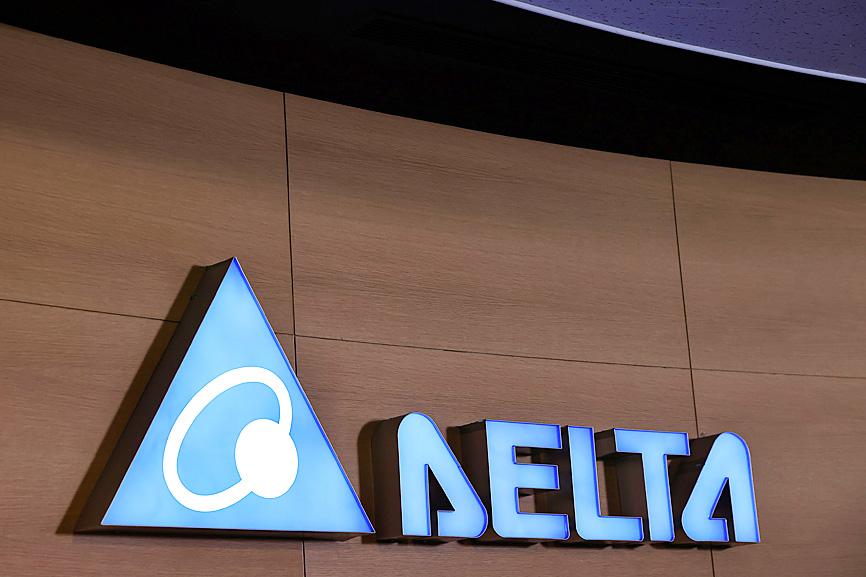Delta Electronics Inc’s (台達電) electric vehicle (EV) products are “growing by 40 to 50 percent year-on-year,” chairman Yancey Hai (海英俊) said yesterday at the company’s annual shareholders’ meeting, where he said he was bullish on EV and energy storage markets.
Even though Delta’s EV business is small compared with overall sales, Hai said he expects rapid growth for EV products.
“Delta is working with major automakers in long-term collaborations,” Hai said. “We can expect future growth, especially if EV prices come down.”

Photo: Ann Wang, Reuters
He also expects Delta’s energy storage business to grow, as Taiwan mandates that heavy industrial users of electricity switch to renewable energy, Hai said.
“As solar and wind power become more important, we are going to need more facilities for energy storage, and providing such storage is also a way for heavy users to meet their renewable energy obligations,” he said.
Delta is already working with state-run Taiwan Power Co (台電) on a storage project on Kinmen.
“We hope that there will be many more,” Hai added.
Because of a nationwide level 3 COVID-19 alert, only three shareholders attended the meeting in person, with the rest watching online.
In response to a shareholder’s question about a components shortage, Hai said that the issue was gradually easing.
“Most of the components shortage involves integrated circuits. After a long period of shortage, the situation seems to be getting a little better,” he said.
Hai also said that Delta was preparing to participate in carbon pricing.
“We have priced carbon at US$300 per tonne internally,” Hai said. “For the time being we will use the money to improve and invest in green power so that we can reach our goal of carbon neutrality as quickly as possible.”
Shareholders yesterday approved the company’s plan to distribute a cash dividend of NT$5.50 per share based on last year’s earnings per share of NT$9.81, which suggested a payout ratio of 56.07 percent.

South Korea’s equity benchmark yesterday crossed a new milestone just a month after surpassing the once-unthinkable 5,000 mark as surging global memory demand powers the country’s biggest chipmakers. The KOSPI advanced as much as 2.6 percent to a record 6,123, with Samsung Electronics Co and SK Hynix Inc each gaining more than 2 percent. With the benchmark now up 45 percent this year, South Korea’s stock market capitalization has also moved past France’s, following last month’s overtaking of Germany’s. Long overlooked by foreign funds, despite being undervalued, South Korean stocks have now emerged as clear winners in the global market. The so-called “artificial intelligence

‘SEISMIC SHIFT’: The researcher forecast there would be about 1.1 billion mobile shipments this year, down from 1.26 billion the prior year and erasing years of gains The global smartphone market is expected to contract 12.9 percent this year due to the unprecedented memorychip shortage, marking “a crisis like no other,” researcher International Data Corp (IDC) said. The new forecast, a dramatic revision down from earlier estimates, gives the latest accounting of the ongoing memory crunch that is affecting every corner of the electronics industry. The demand for advanced memory to power artificial intelligence (AI) tasks has drained global supply until well into next year and jeopardizes the business model of many smartphone makers. IDC forecast about 1.1 billion mobile shipments this year, down from 1.26 billion the prior

NEW IDENTITY: Known for its software, India has expanded into hardware, with its semiconductor industry growing from US$38bn in 2023 to US$45bn to US$50bn India on Saturday inaugurated its first semiconductor assembly and test facility, a milestone in the government’s push to reduce dependence on foreign chipmakers and stake a claim in a sector dominated by China. Indian Prime Minister Narendra Modi opened US firm Micron Technology Inc’s semiconductor assembly, test and packaging unit in his home state of Gujarat, hailing the “dawn of a new era” for India’s technology ambitions. “When young Indians look back in the future, they will see this decade as the turning point in our tech future,” Modi told the event, which was broadcast on his YouTube channel. The plant would convert

People stand in a Pokemon store in Tokyo on Thursday. One of the world highest-grossing franchises is celebrated its 30th anniversary yesterday.